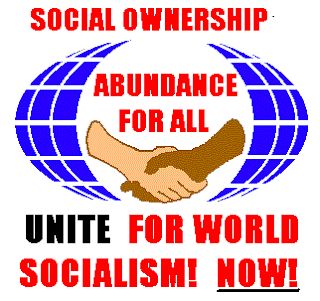The exchange economy implies that the wealth to be exchanged is owned by different people. After all, if one person or one community owned all the wheat as well as all the sheep, the question of exchanging them just would not arise. Exchange presupposes the private ownership of wealth. This is why the establishment of the common ownership of the means of production and distribution will mean the end of exchange and so the disappearance of money. All the wealth that is produced, as well as the means and instruments for producing and distributing it, will belong to the whole community so the problem will be simply to distribute it to where it is needed. This is just a question of organisation. When the wealth has reached the stores then people can freely take of it what they need. Free access is our alternative to money. If we want a society where social wealth can move around the world freely, where it can be produced as human beings need it, we must think about a system which excludes money. The capitalist system hinders distribution and restricts production. Its priority is not efficiency but profit for a minority. It must be swept away and replaced by socialism, the world of free production and access.
Socialism has come to be a dirty word for many people. But it’s only once we establish a socialist society of production for use not profit that nobody will have to pay for housing, for travel, heating, food or healthcare. If you oppose a system of society where the market plays no role and there is free access to goods and services, then don’t expect a decent and dignified life for yourself.
You are one of the working people who operate the factories, work on the farms, build the houses, look after the sick, teach the children, run the transport and communication networks, staff the offices, cook the meals and wash up afterwards. You already provide everything that is consumed in society.
We say that free access is possible as soon as society is organised in a sensible way. You already run the system from top to bottom, spending your entire working life producing everything, yet you give it all away.
There isn’t enough to go around now because, under capitalism, goods are not produced primarily to satisfy needs, but for sale and profit. Production is curtailed. Capitalism is not a system of plenty, it is one of scarcity and shortage.
Humankind has the means, the technical know-how and the skills, to end hunger and poverty. There is no technological reason why manufacturing should not turn out an abundance of the things people need. We can easily grow more and better food; build more and better houses, schools and hospitals. It is a question of incentive. Today where production is geared to profit-making, this is not done because the rule is “no profit, no production”. In socialism where production will be geared instead to meeting human needs, people can go on producing till all their needs are met.
Most people don’t want to be idle and laze around with nothing to do. It is normal to want to do something. Work may be pleasant (as in your leisure-time hobbies) or unpleasant (as in employment). Most people, quite reasonably, expect the work they do voluntarily to be pleasant. In socialism, with satisfying human needs as its aim and where all work will be voluntary, people will ensure that they work in safe and pleasant surroundings and that they enjoy what they are doing to help run the society of abundance which benefits them all.
Automated robots could be designed to do nearly all the dull, repetitive jobs which people are now forced to do because it is cheaper to employ them than to install high-tech machinery. When society is geared to serving human needs, there will be every incentive to design and install machines to eliminate drudgery. If there prove to be some jobs that cannot easily be done by machines, then either they can be left undone or done (perhaps only for short periods) by people who recognise that someone has to do them. That such people will be found is a reasonable assumption since even today the dangerous, but obviously necessary, the job of manning lifeboats is done mainly by volunteers.
It is not quite true that the Socialist Party seeks to abolish money. What it wants is a society in which, among other things, money will become unnecessary. That brings us to the free distribution of wealth, free access to wealth, where people can take from the common store what they need as and when they need it. Socialism is practical and common sense of course shows that it is desirable.



No comments:
Post a Comment